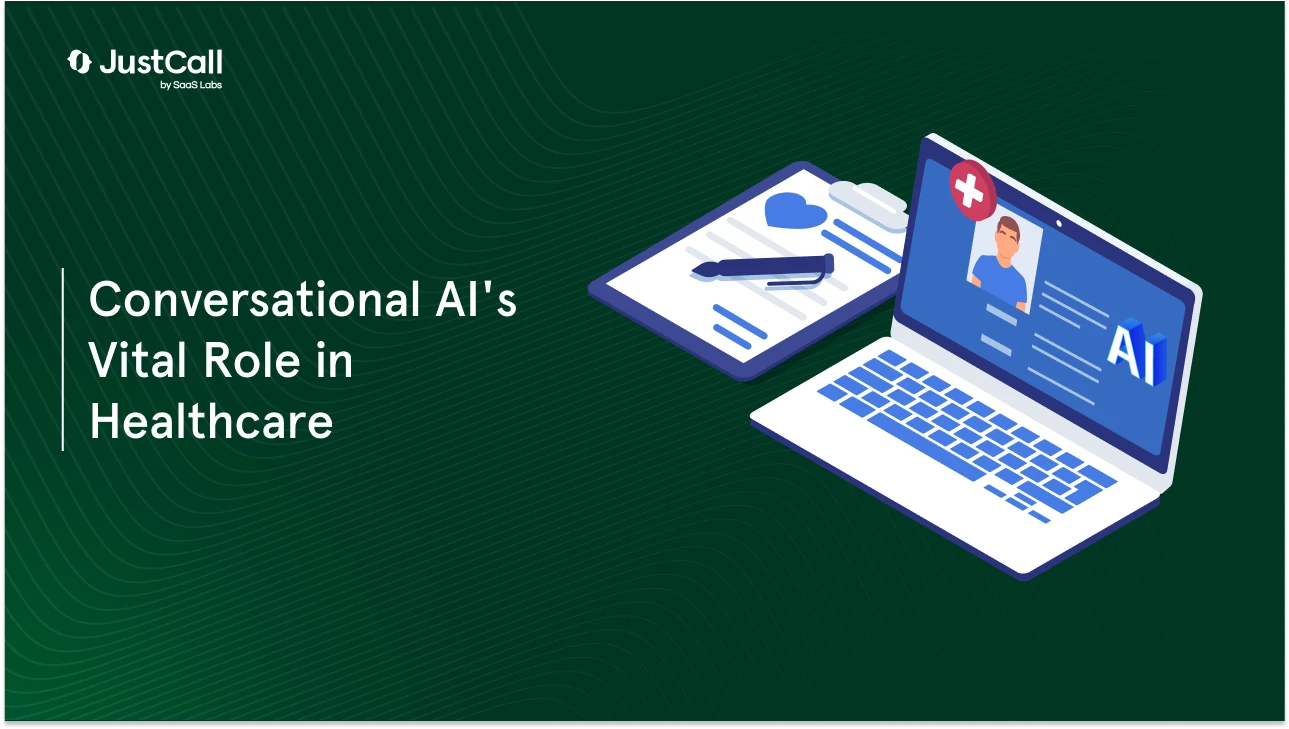According to a UN report, 25% of the population of North America and Europe will be aged 65 or above by 2050. Such a demographic shift will ramp up healthcare requirements. At the same time, the industry is anticipated to face a severe shortage of 9.9 million healthcare professionals by 2030.
The intervening two decades could significantly widen the demand-supply gap, putting healthcare under immense stress. If left untreated, the global healthcare industry will be staring down the barrels of an imminent crisis. Fortunately, the combination of healthcare and conversational AI could be a cure.
Imagine walking into a healthcare facility and being greeted by an AI assistant that can not only check you in but also assess your symptoms and direct you to the right department. Sounds futuristic, right? Well, conversational AI in healthcare is already transforming the way we interact with medical facilities. Companies like Microsoft, IBM, and even startups are pioneering this new frontier to serve healthcare sectors across the globe. The technology is particularly impactful for healthcare systems burdened with administrative tasks, patient management, and a severe shortage of professionals. Conversational AI comes with the promise of making healthcare more efficient, accessible, and personalized.
Let’s take a look.
Challenges Faced by the Healthcare Industry
Even with the incorporation of digital solutions, the healthcare sector continues to grapple with a host of issues that significantly impact both patient care and the workflow of healthcare professionals. Patients often endure extensive waiting times, not just in the waiting rooms but also in securing timely appointments. Scheduling inefficiencies can lead to bottlenecks that tax already-overburdened healthcare providers.
Furthermore, the system frequently lacks personalized patient engagement, often treating healthcare as a one-size-fits-all model rather than tailoring services to individual needs. Medical professionals, on the other hand, find themselves under tremendous stress, juggling between administrative tasks and clinical responsibilities. This leads us to the pivotal question: How can we untangle these complex issues to create a more efficient and patient-focused healthcare system?
Use Powerful Conversation Insights to Drive Call Center Success
Exploring Practical Use Cases
Virtual Health Assistant
Information dissemination and education are crucial for the healthcare industry – not just for patients but also for caregivers. As such, one of the leading use cases of conversational AI in healthcare revolves around information access through virtual health assistants.


Whether it is extracting information from publicly available medical literature, diagnosing conditions based on symptoms, or referring to electronic health records – conversational AI can dive into a sea of information and fish out relevant details.
Most importantly, conversational AI can personalize healthcare through data-backed, customized, and valuable insights. While offering such a service, it also mitigates panic, confusion, and misinformation that can aggravate a health concern.
Appointments & Scheduling
It takes patients about 17.20 minutes to complete registration alone. The subsequent pre-consultation takes up to 13.66 minutes on average. That’s nearly half an hour wasted in the waiting room! We’re not even taking into account the time required to book the appointment in the first place.
Conversational AI can alleviate such friction through hands-on appointment and schedule management. Patients can effortlessly book, modify, or cancel appointments over a website or an app – and it barely takes minutes.
Pair this with pre-consultation formalities like patient registration, sharing of medical records, and exchange of other pertinent details. Such a setup respects the patient’s, caregiver’s, and hospital staff’s time.
Patient Triaging and Escalations
Typically, a sniffle may not be as alarming as tightness in one’s chest. In simpler words, not all health conditions are alike. As such, a healthcare conversational AI tool can be instrumental as a diagnostic tool for documenting and classifying symptoms and escalating emergency cases.


They ask patients a series of questions to evaluate their symptoms while also pulling in data from their health records. Thereafter, they conduct a comprehensive and cross-functional analysis of patients’ symptoms, age, conditions, comorbidities, etc., to determine the condition, its severity, and the level of care required.
Triaging and escalations can help manage and prioritize nursing workloads to ensure every patient gets the best care available.
Stats and Facts
- According to a study from Juniper Research, conversational AI can reduce business expenses by up to $8 billion annually by 2022.
- Gartner predicts that by 2022, 70% of white-collar workers will interact with conversational platforms daily.
- A report by Accenture found that AI could add an additional $150 billion in annual savings for the US healthcare economy by 2026.
How JustCall Can Help
JustCall can be an integral part of this transformative journey. Our solutions in conversational AI can help healthcare systems implement and manage highly efficient customer service SOPs. The AI can handle everything from appointment scheduling to post-care follow-ups, thus significantly reducing operational friction. Just imagine—before AI, a simple appointment could eat up nearly 30 minutes of your time. With JustCall’s AI solutions, it’s a matter of minutes, and you have the rest of the day to yourself.
Effective Health Management
Whether it is after a hospitalization stint or in-between procedures, or long-term healthcare, conversational AI can step in at any stage to spearhead sustained healthcare.
For instance, they can integrate with remote patient monitoring devices or smart wearables to analyze patient vitals, activity levels, and behaviors. Similarly, they can issue medication reminders, notify of upcoming prescription refills, celebrate fitness milestones, or alleviate concerns surrounding side effects.
Such proactive monitoring of health reduces the risk of readmission or relapse while also motivating them to make healthier life choices. Partnering with health insurers can add another layer of incentive to motivate patients to live healthily.
Patient Support & Engagement
Apart from effecting long-term behavioral change, conversational AI in healthcare can also play a supportive role in various other aspects. As mentioned, it can assuage worries one may have about a certain medication and its side effects. Or it can monitor dosage and frequency. And it can even motivate patients to meet their wellness goals.
At the same time, it can offer personalized diet plans, exercise tips, or chronic disease management strategies. Similarly, it can offer mental health support. From sharing useful resources and coping mechanisms to just being available for a chat, conversational AI healthcare solutions can start empathetic dialogs and crush the stigma around seeking emotional support or help.
Service Enhancement
Conversational AI in healthcare can improve healthcare services and make them more patient-centric. We’ve already talked about how it opens up avenues for self-servicing and 24/7 availability. Along the same lines, it helps with effective patient management by minimizing hospital visits and suggesting suitable actions depending on the patient’s condition.
However, those aren’t the only ways in which conversational AI improves healthcare services. It allows healthcare establishments to collect patient feedback on their experience and act on the relevant ones. Organizations can also leverage it for hiring and training staff to sensitize them to patient needs. Doctors and physicians can resort to conversational AI for cross-validating clinical decisions or treatment plans and accessing vital information.
Each of these benefits contributes to the larger picture of patient-friendly healthcare.
Scaling Healthcare and Conversational AI
The above use cases of conversational AI for the healthcare industry would have sparked inspiration and determination. As for the implementation and scaling part, conversational AI will go through three prominent phases
The first involves the low-hanging fruit of automating and handling routine and repetitive administrative tasks. As we’ve seen, conversational AI in healthcare can easily cater to activities like appointment management, information dissemination, and continued support.
JustCall serves as a catalyst in this evolution, offering AI solutions that not only fit into but also revolutionize existing healthcare systems. By adopting tools like those offered by JustCall, healthcare can become more efficient and patient-centric, effectively scaling to meet both current and future demands.
Such a tiered integration of healthcare and conversational AI can help the industry scale. So, use conversational intelligence to offer the best patient care.












